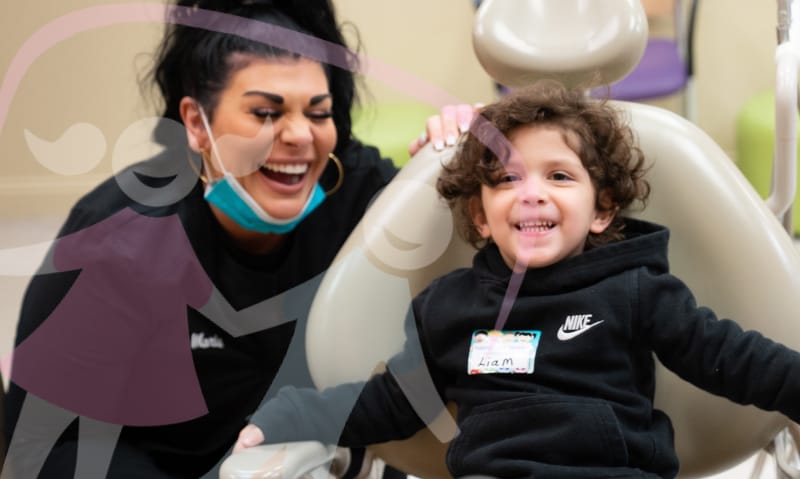Save Time, Money, and Pain With Dental Sealants

Discover how dental sealants can prevent tooth decay.
Many parents are familiar with fluoride and its ability to help protect their children’s teeth. And although fluoride is a beneficial weapon in children’s dentistry and the fight against tooth decay, it is limited in its ability to protect the whole tooth since it only works on the tooth’s smooth surfaces. For this reason, many dentists now recommend that children (and adults) consider dental sealants to seal off fissures in the teeth. If you are unfamiliar with dental sealants, you probably have several questions about what they are and what they do.
What are dental sealants?
Introduced back in the 1960s as a preventive dentistry measure, dental sealants are actually a plastic resin that’s painted onto the chewing surfaces of the back teeth (premolars and molars). The resin hardens quickly when applied to teeth and bonds with the deep grooves. Getting dental sealants is completely painless, meaning they don’t require any anesthesia or drilling that could make your child nervous.
It only takes a few minutes to apply dental sealants. Typically your child’s dentist will thoroughly clean and dry the teeth the sealants will be applied to (an absorbent material, such as cotton, may be placed around the teeth to keep them dry). Once the teeth are properly prepped, an acid solution will be applied to the chewing surfaces of your child’s teeth to roughen them up, thus allowing the sealant to bond better on the teeth. The teeth will then be rinsed and dried again. Finally, the sealant will be painted onto the enamel of each tooth, hardening in just a few minutes. A harmless curing light is sometimes used to help the sealant bond faster.
Which teeth can benefit from dental sealants?
The back permanent teeth, premolars and molars, will benefit from dental sealants. In some situations, however, your child’s pediatric dentist may recommend dental sealants for baby teeth, especially if those baby teeth have deep depressions or grooves. Baby teeth play a critical role as placeholders for permanent teeth, so dental sealants can help keep them healthier so they do not fall out too early.
Who are the best candidates for dental sealants?
Though adults can be candidates for dental sealants, in most cases, sealants are applied to children’s teeth (between 6 and 14), when the teeth are most prone to cavities. And since sealants can last as long as ten years, they will help protect the chewing, cheek, or tongue surfaces of the teeth as children grow into young adults.
Put simply, there are five groups of people who could benefit from the application of dental sealants.
- Children with newly-erupted teeth
- Children or adults with deep grooves in their teeth
- Those who eat snacks that are high in sugar or carbohydrates
- Those with a history of tooth decay
- Those with health conditions that make stable dental health more challenging to achieve
For adults, it is important to know that not everyone is a good candidate for dental sealants because sealants should not be applied over teeth that need treatment or that suffer from tooth decay. This said, if your tooth has pits, holes, or grooves from decay, your dentist will likely recommend that you receive dental treatment for that tooth first before considering sealants. If you are an adult who is interested in dental sealants, consult your family dentist for more information and guidance.
Dental sealants can save parents time and money.
Getting dental sealants for your children can be good for your wallet in the long run. By protecting your children’s teeth from tooth decay with sealants, you are gaining a cost-effective way to maintain their oral health and avoid the need for costly crowns or root canals down the road. And since sealants can last up to ten years, you can almost set them and forget them.
Though teaching your child how to properly care for their teeth at home is still critical, parents can anticipate that their children will likely remain cavity-free for as long as the dental sealants are in place. So not only are you saving money now, but you are saving money in the future too. A healthier mouth means fewer out-of-cycle trips to the dentist. This means you can stay focused on your twice-a-year visit instead of coming in several times in the middle to treat a cavity or toothache.
Request an appointment with Pediatric Dental Specialists of Greater Nebraska.
If you are interested in dental sealants for your children and live in the Greater Nebraska area, now is the time to request an appointment with Pediatric Dental Specialists. We’re confident that after your child’s first visit, you’ll see why you can stop searching the internet for the “best pediatric dentist near me.” We believe we can be that best pediatric dentist for you and your child. We look forward to seeing you soon!